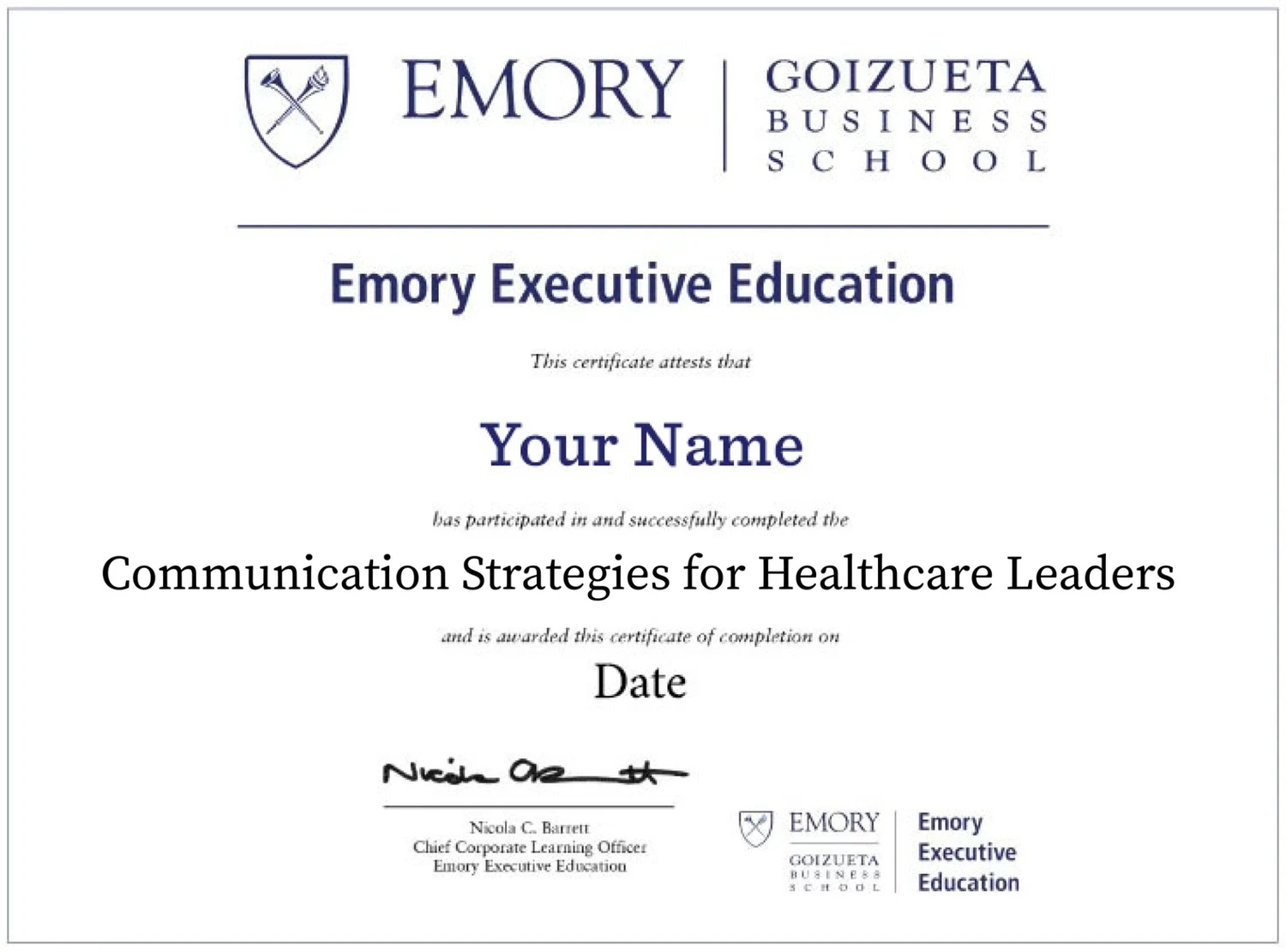
Communication Strategies for Healthcare Leaders
Effective Healthcare Communication for Optimal Patient Care
The fast-paced, high-stress environment presents unique healthcare communication challenges for leaders. Communication breakdowns can occur at any stage of the care process, often due to frequent interruptions or misunderstandings between healthcare staff and patients and their families. The consequences of inadequate communication can be dire, even contributing to in-hospital deaths, fragmented care, operational inefficiencies and subpar staff performance. Effective communication across all stages can lead to better care planning and improved patient care.
The six-week Communication Strategies for Healthcare Leaders course offers a valuable opportunity to build core leadership capabilities beyond business acumen. The immersive learning journey emphasizes rational and emotional competencies as well as collaboration and conflict resolution, enabling you to gain a competitive edge in leadership roles. Through innovative frameworks, real-world case studies, insights from industry experts, and peer discussions, you will hone your communication to drive a positive impact and establish an influential executive presence for improved patient outcomes.
What You Will Learn in the Course
The course will help you:
Explore how your unique personality traits and presence can influence teams, patient interactions, and your overall career trajectory.
Identify healthcare communication strategies for winning hearts and minds within clinical teams or healthcare settings.
Recognize the dynamics at play during complex interactions.
Interpret conflict dynamics to improve leadership strategies in healthcare for the betterment of patient outcomes.
Adapt your leadership style to motivate your teams toward achieving shared goals.

Hear from the Faculty
“The healthcare culture is driven by a mindset that deeply values growth, knowledge, and action to enhance patient care. Fragmented care occurs when there is a disconnect in the communication strategies between healthcare staff, patients, and other stakeholders. The Communication Strategies for Healthcare Leaders course is designed to provide healthcare professionals with effective strategies and frameworks needed to navigate organizational complexity and interpersonal communication challenges.”
— Roderick W. Gilkey, PhD
Professor of Psychiatry and Behavioral Sciences, School of Medicine; Emeritus Professor in the Practice of Organization & Management, Goizueta Business School
Course Highlights

Participate in a course that is designed by an award-winning expert in psychiatry, neuroimaging, and business management.

Acquire a deeper understanding of the concepts covered in each module through real-life healthcare industry scenarios.

Access recorded sessions that provide the flexibility to learn at your own pace with a weekly commitment of three to five hours.

Gain multiple frameworks and tools to help craft your communication strategies, including a proprietary framework for creating highly effective work environments.

Introspect to identify your strengths and weaknesses as a leader using a variety of self-assessment exercises in the modules.

Practice course learnings through assignments and discussions that will accelerate your ability to integrate the learnings in your professional role.

Explore case studies of prominent leaders that demonstrate the impact and importance of successful communication strategies.

Work on a capstone project to refine your skills by applying course learnings to a communication challenge in your organization for immediate on-the-job impact.

Gain insights into communication and conflict resolution from industry experts who share their extensive experience in the field.
Curriculum
The comprehensive curriculum will help you develop core leadership capabilities beyond business acumen to tackle communication challenges you may encounter often.
Capstone Project
The capstone project involves developing a detailed action plan for a challenging situation facing your organization that requires the integration of stress management, leadership strategies, and conflict resolution. You will be asked to reflect on the anticipated or actual outcomes of your plan, any obstacles you may face, and how you intend to overcome them.
Frameworks and Tools
The important tools and resources are aimed at developing the competencies necessary for developing communication strategies and effective leadership in healthcare.
Six leadership styles: Research from Daniel Goleman highlighting six distinct leadership styles based on different aspects of emotional intelligence
Situational leadership II model: Activity for participants to reflect on leadership skills and approaches that they already use and those they need to develop
Four communication strategies: Communication strategies to increase the efficiency of teams and influence the culture of an organization
Nominal group technique: Technique to improve group decision-making, from Alfred Sloan of General Motors, by encouraging all team members to express their opinions
12-step protocol for challenging conversations: Tool that prepares leaders to anticipate, plan for, and conduct challenging conversations
Brain-friendly environments: A proprietary framework for creating an environment where everyone can achieve their potential
Course Faculty

Professor of Psychiatry and Behavioral Sciences, School of Medicine; Emeritus Professor in the Practice of Organization & Management, Goizueta Business School
Roderick W. Gilkey holds a joint appointment at Emory University, as a Professor of Psychiatry and Behavioral Sciences at the Emory School of Medicine and at the Goizueta Busi...

Certificate
Upon successful completion of the program, participants will be awarded a verified digital certificate by Emory Executive Education. The certificate is a recognition of your achievement and the investment you and your organization have made in your education and development.
FAQs
Connect with a Learning Advisor for a 1:1 Session
Didn’t find what you were looking for? Write to us at learner.success@emeritus.org or Schedule a call with one of our Program Advisors or call us at +1 585 549 3600 (US) / +44 113 519 1455 (UK) / +65 3138 1545 (SG)
Flexible payment options are available.
Starts On
